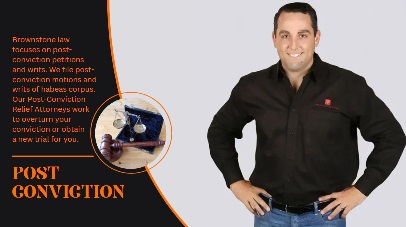The journey through the legal system doesn’t end with a conviction; when a verdict has been conveyed and a sentence is implied, a muddled process begins, one that offers different legal responses for individuals who have been convicted. From appealing the verdict to searching for post-conviction relief, understanding what happens after a conviction is essential for anyone expecting to guard their privileges.
In this article, we will isolate the legal process following a conviction and examine the fundamental job that post-conviction lawyers in Florida play in shielding the interests of individuals who have been seen as blameworthy.
The Appeal: Challenging the Conviction
Quite possibly of the most common course taken after a conviction is filing an appeal. In essence, an appeal is a solicitation made to a higher court to review the decisions of a lower court. Appeals are not new trials yet rather a legal assessment to decide whether the first trial was led reasonably and if any legal errors were made that might have impacted the outcome.
A convicted individual should file a notice of appeal inside a specific timeframe — normally in something like 30 days of sentencing. The litigant (the individual appealing) and their lawyer should prepare an exhaustive brief illustrating the errors they trust happened during the trial. These errors could incorporate inappropriate admission of evidence, incorrect jury instructions, or ineffective assistance of trial counsel.
In Florida, post-conviction lawyers play a fundamental role in planning appeals. Their expertise is fundamental in spotting legal mistakes and fostering a persuasive contention to present to the appellate court. The appellate process can be long, and success isn’t ensured. However, the appellate court has the position to switch a conviction, request a new trial, or modify a sentence if they track down merit in the appeal.
Post-Conviction Relief: Beyond the Appeal
While appeals center around legal errors during the trial, post-conviction relief offers greater answers for keeping an eye on injustices after the trial has shut. Post-conviction motions grant individuals to challenge the legality of their conviction or sentence considering components not watched out for in the appeal process.
One of the most widely recognized sorts of post-conviction relief is a motion to vacate, put away, or right a sentence under Rule 3.850 of the Florida Rules of Criminal Strategy. This sort of motion can be documented on grounds, for instance,
- Newly discovered evidence that might have changed the outcome of the trial
- Ineffective assistance of trial counsel, meaning the protection lawyer didn’t skillfully represent the respondent
- Constitutional violations, for example, fair treatment or equivalent assurance rights being encroached during the trial
- Evidence of prosecutorial misconduct or ill-advised activities by the state
Post-conviction relief is a basic part of the judicial process for people who accept that their conviction was crooked. Post-conviction lawyers play a crucial role in identifying the grounds for these motions and exploring the legal intricacies associated with filing them.
Habeas Corpus Petitions
One more road for post-conviction relief is the writ of habeas corpus, a legal activity that challenges the legality of an individual’s confinement. Habeas corpus petitions are ordinarily filed in government court after an individual has depleted all state-level appeals and post-conviction relief options. The writ of habeas corpus can be used to contend that an individual is being unlawfully held, frequently on constitutional grounds.
In Florida, habeas corpus petitions are a vital methodology for the people who have been illegitimately convicted or who are carrying out crooked punishments. This process is complicated, requiring an inside and out understanding of both state and government laws. Post-conviction lawyers in Florida are knowledgeable in dealing with habeas petitions, and their insight into constitutional law is pivotal in introducing a convincing case.
Clemency and Pardons
Beyond judicial cures like appeals and post-conviction relief, people who have been convicted may likewise look for clemency or a pardon from the presidential branch. Clemency is a type of benevolence that can take a few structures, including the decrease of a sentence (compensation) or the total absolution of a crime (pardon).
In Florida, clemency petitions are reviewed by the Florida Commission on Guilty party Review, which then makes proposals to the Lead representative. Clemency isn’t ensured, and the process is optional, meaning it relies intensely upon the case’s benefits and the conditions of the singular looking for relief.
Post-conviction lawyers in Florida can guide their clients through the clemency process, ensuring that all vital documentation is all together and introducing a persuasive contention for leniency. Clemency is many times the final hotel for people who have depleted every judicial choice and are looking for relief in view of philanthropic grounds.
Sentence Modification
At times, people might have the option to look for a modification of their sentence even after a conviction has been maintained. Florida considers sentence modifications under specific circumstances, like changes in the law or evidence of recovery. A motion for sentence modification can be filed, mentioning the court to reexamine the first discipline and perhaps reduce the sentence.
While sentence modification isn’t generally accessible, it gives an extra layer of insurance for people who have been convicted. Post-conviction lawyers in Florida are skilled at identifying situations where a sentence modification might be justified and can help their clients request the court for reexamination.
Final Word: The Significance of Gifted Legal Representation
The judicial process after a conviction is multifaceted, offering different legal solutions for those looking for justice. From appeals and post-conviction relief to habeas corpus petitions and clemency applications, people have a few options to challenge their conviction or sentence. However, exploring this post-conviction scene requires profound legal expertise and experience.
This is where post-conviction lawyers in Florida, for example, the experienced group at Brownstone Appeal Lawyers, become possibly the most important factor. These lawyers specialize in post-conviction procedures and have a demonstrated history of battling for their clients’ rights.
Whether it’s filing an appeal, drafting a motion for post-conviction relief, or seeking after a habeas corpus request, Brownstone Appeal Lawyers offer the legal understanding and support expected to look for justice even after a conviction.
If you or a friend or family member has been convicted and are looking for post-conviction relief, talking with seasoned professionals like Brownstone Appeal Lawyers can have a significant effect for your situation.



